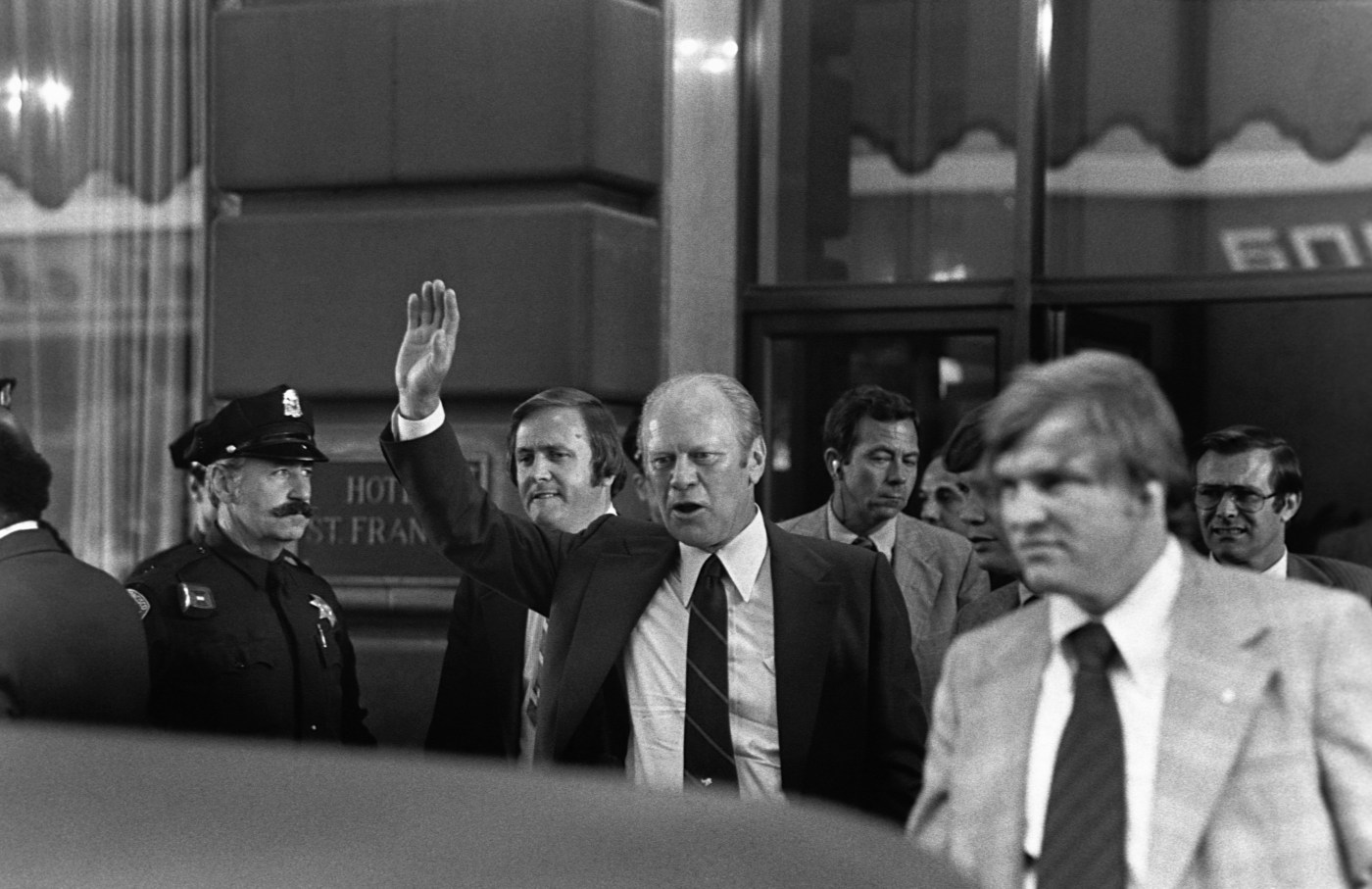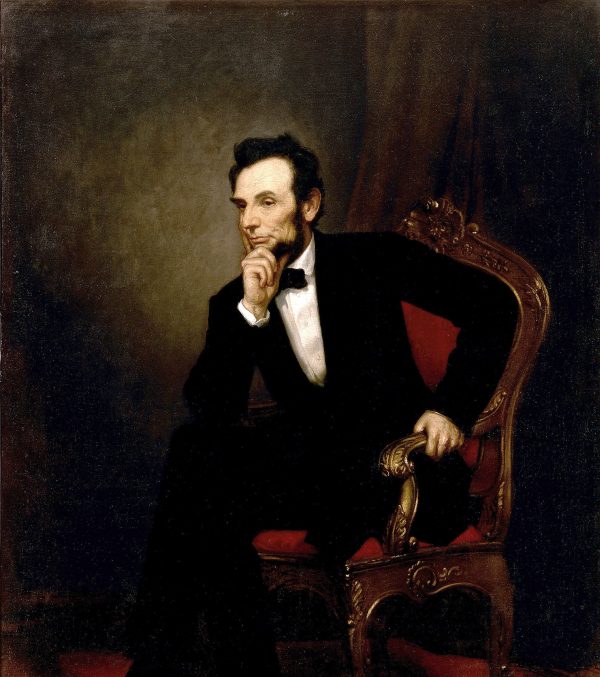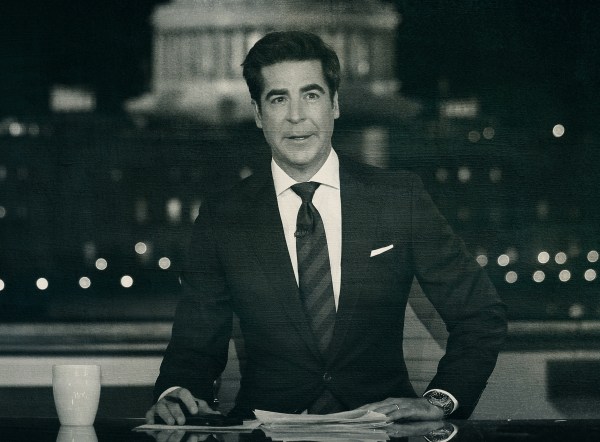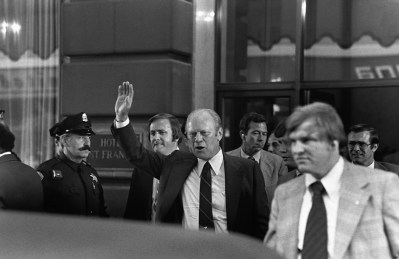Turn any article into a podcast. Upgrade now to start listening.
Premium Members can share articles with friends & family to bypass the paywall.
Fifty years before a radicalized Tyler Robinson allegedly killed conservative activist Charlie Kirk because he “had enough of his hatred,” a pair of 1970s radicals attempted to murder President Gerald Ford, justifying the action as necessary to advance their own political agendas.
The assassination attempts shocked Americans, who had seen far too many incidents of people using violence to solve political conflicts in that era. And on that score, things were undoubtedly far worse back then, on the heels of the assassinations of the Kennedys and Martin Luther King Jr. in the 1960s and a spate of bombings by radical groups in the early 1970s. The thwarted shootings also came after a decade’s worth of disillusionment, from government deceptions during the Vietnam War to the Watergate scandal that chased President Richard Nixon from office.
In the wake of Kirk’s assassination, public figures from across the political spectrum have stressed the need to resolve political differences through debate, not violence. That was a sentiment expressed by Federal Judge Samuel Conti five decades ago, at the sentencing hearing of one of Ford’s attackers. “What ever happened to ‘The pen is mightier than the sword?’” he pleaded.
But Ford’s attackers, like Robinson, saw violence as the answer. As Robinson wrote in a text message to his roommate, according to court documents, “Some hate can’t be negotiated out.”
The September 1975 attempts on Ford’s life were striking in several respects. They took place less than three weeks apart and happened less than 90 miles from each other in Northern California. And both attackers were the first—and to this day, the only—women to try to kill a U.S. president.
Lynette “Squeaky” Fromme made the first try, on September 5 in Sacramento. Fromme, 26, was a devoted follower of cult leader Charles Manson, who dubbed her “Squeaky” because of her high-pitched voice. At the time, Manson was serving a life sentence for the murders of actress Sharon Tate and several other people in 1969. After he went to jail in ’71, Fromme was called the unofficial leader of the Manson “family.”
As Ford walked from his hotel to the California Capitol to meet the state’s Democratic governor, Jerry Brown, Fromme aimed her .45-caliber handgun at the president. But the plan was foiled when the gun, although loaded, had no bullets in the chamber.
Newsweek ran a cover photo of the would-be shooter in the moments after her capture, alongside the words Fromme shouted after the failed attempt: “It Didn’t Go Off!” Time magazine also gave her the cover treatment: “THE GIRL WHO ALMOST KILLED FORD,” the publication blared alongside an almost innocuous headshot of a young, freckle-faced woman.
Time noted in its coverage that Ford, a genial Republican, was an unlikely target for such an attack. He had been in office barely a year, following Nixon’s resignation, and wasn’t a polarizing figure, although he angered many Americans when he pardoned his predecessor. “But Squeaky Fromme had discovered her own reasons to dislike the man,” the magazine reported. “With Sandra Good, her roommate and another member of the Manson ‘family,’ Fromme issued a statement to the press two months ago equating Ford with Richard Nixon, the man whom the clan has always blamed as the source of its troubles with the law.”
Good told the publication that Fromme “apparently was moved by the disaster facing the country from air and water pollution. Nixon lied to the people, and Ford is continuing to lie to the people. He is not doing anything.” (Radicals had much to criticize Nixon for, but the environment was a strange grievance; the former president created the Environmental Protection Agency and spearheaded other landmark conservation initiatives.) Good added that she and Fromme were members of an “international people’s court” that was prepared to kill polluters of the air and water, including presidents and top company executives.
Ford was defiant following the attempt. “This incident under no circumstances will prevent me or preclude me from contacting the American people as I travel from one state to another and from one community to another,” he told reporters that same day. “In my judgment, it is vitally important for a president to see the American people, and I am going to continue to have that personal contact and relationship with the American people.”
But when he was back in California on September 22, a half-century ago today, a radical left-wing activist named Sara Jane Moore fired at him in San Francisco. Once again, the president escaped harm when a former Marine grabbed Moore’s arm as she fired, deflecting the shot.
Moore, a twice-divorced 45-year-old mother of four and former FBI informant, told Secret Service agents that had Ford been any later, she “would have had to leave to pick up my boy” at school. Her 9-year-old son was taken into protective custody.
In an interview with the Los Angeles Times that was published three days later, Moore justified her attempt on the president’s life as “a kind of ultimate protest against the system,” and said she hoped it would unite the radical movement. “I did not want to kill somebody, but there comes a point when the only way you can make a statement is to pick up a gun,” Moore added. She also mocked Ford’s protective detail, comparing her assassination attempt to “target practice. The security was so stupid. It was like an invitation.”
Ford press secretary Ron Nessen, who witnessed both assassination attempts, told the San Francisco Chronicle in 2006 that the president found them puzzling. “But it was the ’70s in San Francisco and California, and there was lots of anti-Vietnam War activity and lots of anti-government activity,” said Nessen, who died this year at the age of 90.
Both women wound up getting life sentences, although they were later released on parole (Moore in 2007, Fromme in 2009). And both used their sentencing hearings to tout their political agendas.
In November ’75, Fromme was convicted following a three-week trial that included videotaped testimony from Ford and several outbursts from the defendant. “Judge Thomas J. MacBride treats her like a child who has misbehaved. And she treats him like a father who doesn’t understand her,” wrote Lucinda Franks in a New York Times story. After evicting Fromme from the trial for one of her outbursts, the judge told attorneys, “If she’s a good girl, she can come back.” Fromme wrote a letter to MacBride telling him of her concern for the California redwoods and pollution, among other things.
At her sentencing hearing in December, she continued to act out. When the prosecutor urged the judge to hand out a severe sentence, calling her full of “hate and violence,” she threw an apple at him and yelled, “He’s the one to talk about hate!”
During Fromme’s lengthy statement, she called for Manson to be freed and lectured the court about the environment. “All of us offend common sense when we destroy the earth as we are doing now,” Fromme said.
That was a bit too much for MacBride, a 1961 appointee of President John F. Kennedy. He said he was convinced Fromme would try to murder again “in the false and distorted belief that only terror and violence can save our environment and natural resources.”
He then referenced the trio of high-profile assassinations of the 1960s: “Had John Kennedy, Robert Kennedy or Martin Luther King been allowed to live out their lives rather than having fallen at the hands of a person like yourself, they could have accomplished more for our environment and for all mankind than all the terrorists in the history of the world—you and Charles Manson included.”
After she was sentenced to life, Fromme threw herself on the floor. “You animals!” she shouted as U.S. marshals carried her out.
Moore, meanwhile, skipped a trial and pleaded guilty to trying to kill Ford. At her sentencing hearing in January 1976, Conti, the judge in her case, said Moore wouldn’t have committed the crime “if we had in this country any effective capital punishment law.” (The U.S. Supreme Court had struck down the death penalty in 1972, but would reinstate it in ’76; prosecutors in the Robinson case have said they will seek the death penalty.)
Conti, a conservative judge nominated by Nixon whose nickname was “Slammin’ Sam,” called Moore “a product of our times, a product of a permissive society.” Today we hear echoes of that evaluation from conservatives like Ben Shapiro, who has assailed what he calls “a permission structure for violence.”
Moore told the judge that assassination was “a valid political tool” when “used selectively and with the purpose clearly and publicly stated.”
“Am I sorry I tried” to kill the president? she asked. “Yes, because it accomplished little except to throw away the rest of my life. And no, I’m not sorry I tried, because at the time it seemed a correct expression of my anger, and, if successful, the assassination combined with the public disclosures of this government’s own activities in this area just might have triggered the kind of chaos that could have started the upheaval of change.”
Conti said he found her statement disturbing because it showed “how calloused we have become to crime and violence, and we have accepted it as an ingredient of our daily life. And we are tolerating it. And we allow semantics to pervade our way of life by saying if we are angry at somebody, or we want to make a statement, what do we do? We shoot them. Or we bomb them.”
After he asked rhetorically what happened to the pen being mightier than the sword, Moore countered: “Why don’t you ask the people in Washington the same thing?”






Please note that we at The Dispatch hold ourselves, our work, and our commenters to a higher standard than other places on the internet. We welcome comments that foster genuine debate or discussion—including comments critical of us or our work—but responses that include ad hominem attacks on fellow Dispatch members or are intended to stoke fear and anger may be moderated.
With your membership, you only have the ability to comment on The Morning Dispatch articles. Consider upgrading to join the conversation everywhere.